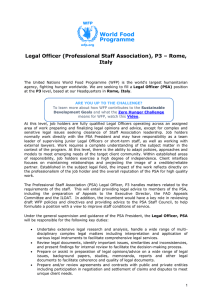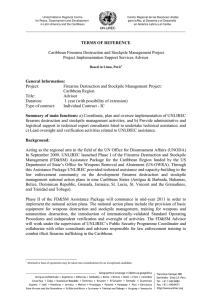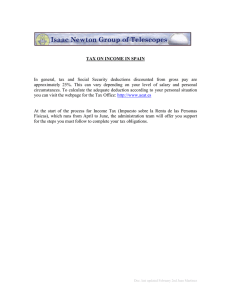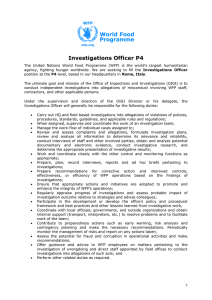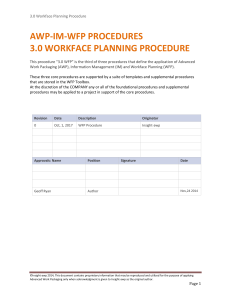The Cost of Hunger
Anuncio
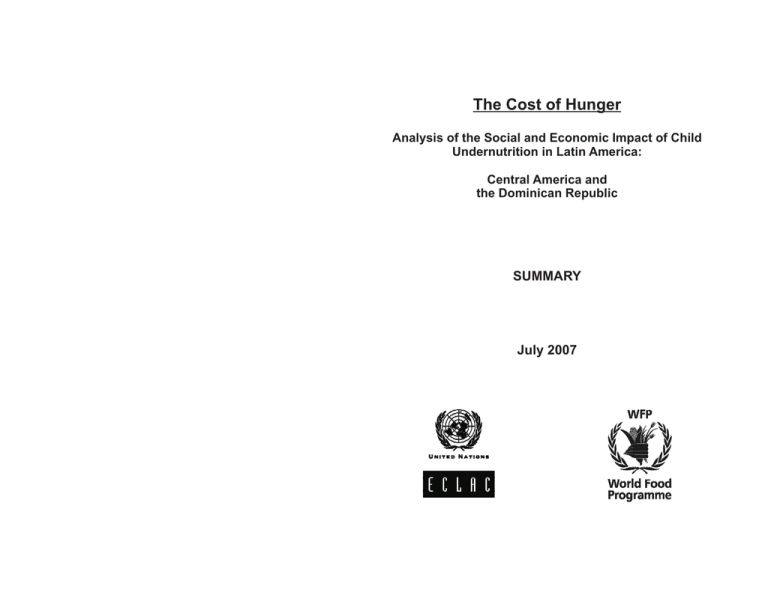
The Cost of Hunger Analysis of the Social and Economic Impact of Child Undernutrition in Latin America: Central America and the Dominican Republic SUMMARY July 2007 2 3 ACKNOWLEDGMENTS The following is a synopsis of the report “The Social and Economic Impact of Child Undernutrition in Central America and the Dominican Republic”, part of the project Analysis of the Economic and Social Impact of Hunger in Latin America, jointly undertaken by José Luis Machinea, Executive Secretary of the United Nations Economic Commission for Latin America and the Caribbean (ECLAC), and Pedro Medrano Rojas, Regional Director for Latin America and the Caribbean of the United Nations World Food Programme (WFP). The project was coordinated by Rodrigo Martínez of the Social Development Division at ECLAC and Judith Thimke and Carlos Acosta Bermúdez of WFP's Regional Office for Latin America and the Caribbean within the framework of WFP's project 10411.0: Capacity-Building in Support of Food-Based Social-Protection Programs. The team in charge of designing, implementing and writing the study was led by Rodrigo Martínez and Andrés Fernandez with the assistance of Ernesto Espíndola, Lorena Flores, Ana María Montoya, Enrique Oviedo and Andrea Peroni from the Social Development Division at ECLAC. Additional support for the analysis was provided by Fernando Vío, Jorge Martínez, Marco Méndez and Daniza Ivanovic from the Institute of Nutrition and Food Technology at the University of Chile (INTA). The information gathering component in the various countries was undertaken by a professional team from the Institute of Nutrition of Central America and Panama (INCAP) under the coordination of Mireya Palmieri, and with the assistance of WFP country offices and a team of professionals and technical staff from the Health and Education Ministries and Secretariats of each country The authors are appreciative of the significant institutional contribution provided to this project by José Luis Machinea and Pedro Medrano Rojas, as well as the inputs provided by the members of the study's Advisory Committee: Michelle Adato, Eduardo Atalah, Harold Alderman, Jere Behrman, Martin Bloem, David Bravo, Ángela Céspedes, Hernán Delgado, John Fiedler, Rafael Flor, Fitzroy Henry, Ana Heredia, Deborah Hines, Susan Horton, Gordana Jerger, Beatrice Rogers, Juan Rivera Dommarco, Patrick Webb and Andreas Uthoff and Arturo León of the Social Development Division at ECLAC. CONTENT Foreword ..………………4 Regional Report Comparative Analysis ..………………7 Results by Country Costa Rica ………………18 Dominican Republic ………………24 El Salvador ………………30 Guatemala ………………36 Honduras ………………42 Nicaragua ………………48 Panama ………………54 Bibliography ………………60 This document has not been subject to an editorial review. The opinions expressed are the sole responsibility of the authors. 2 3 FOREWORD Undernutrition deprives children of essential nutrients that are required during their most important period of growth, creating permanent and irreversible physical and mental damage. Besides impeding the full development potential for these children, undernutrition also affects general economic progress as well as imposes additional costs on society by placing increased pressure on health and educational systems. Undernourished children begin life with an inherent impediment: a higher prevalence of death during the first few days after birth as compared with those children born with adequate weight. Undernourished children are also more vulnerable to infectious diseases that reduce their appetite, prolong their undernutrition and continue to inhibit their development. Furthermore, the cognitive and behavioral development of these children is more likely to become impaired over the years. Even if undernourished children reach school age, their ability to learn and concentrate will be limited, eventually hindering their opportunity to access better jobs. Unless immediate action is taken, this pattern is likely to repeat itself in future generations, perpetuating the devastating cycle of poverty and undernutrition. In addition to the ethical and social issues of child undernutrition, there are significant negative economic repercussions that affect the life cycle of each individual and that of their children. This contributes directly to the perpetuation of undernutrition and poverty. Undernutrition is a serious problem in LatinAmerica and the Caribbean, despite the fact that the region produces more than enough food to meet the nutritional requirements for its population. While governments have expressed a strong will to fight hunger and undernutrition, the problem persists, revealing the vast inequalities that exist in the region. Today, 53 million people in the region lack the food required to meet their most basic nutritional needs, 7 percent of children under the age of five are underweight, and 16 percent of all children under five show low height-for-age. series of descriptive and analytical studies have been prepared, including an estimate of the social and economic costs generated by child undernutrition. These studies and estimates aim to help share lessons-learnt, methodologies, and best practices among stakeholders in the region. Within this framework, the report “The Social and Economic Impact of Child Undernutrition in Central America and the Dominican Republic” provides concrete and compelling evidence of the importance of good nutrition and most importantly, it analyses the impact of the high prevalence of undernutrition on the region and the enormous and unnecessary loss of human and economic potential. The report concludes that for the seven countries under study in 2004, the losses amounted to US$6.658 billion. This huge toll not only highlights the importance of fighting hunger and undernutrition, but also provides an increased motivation for strengthening alliances among national governments, the private sector and civil society, in order to prompt immediate action to eradicate hunger and undernutrition. Eradicating hunger and undernutrition is a moral, ethical, and economic obligation. We recognize that our region produces three times the amount of food required to meet the needs of our population, so there is room for hope and an opportunity to work together to help children break free from the vicious cycle of hunger and poverty. Furthermore, by mustering political will and making determined efforts, we can provide pregnant women and children under the age of five universal access to nutritious foods, basic health services and education, thus helping to break the destructive cycle of undernutrition within a generation. José Luis Machinea Executive Secretary Economic Commission for LatinAmerica and the Caribbean Pedro Medrano Rojas Regional Director for LatinAmerica and the Caribbean World Food Programme Faced with the gravity of this situation, the Economic Commission for Latin America and the Caribbean (ECLAC) and the World Food Programme (WFP) launched a joint effort to assist governments in raising awareness of the magnitude of this problem. A 4 5
